Gearing up for “Ocean First” Focus with Concept Mapping
| | | | Tabor Academy high school seniors create a concept map about
global climate change | | Jennifer (Jenn) Bowdoin is a first-year teacher and science faculty member at Tabor Academy in Marion, Massachusetts – a four-year (9-12 grade) private boarding school that emphasizes marine sciences. Jenn teaches biology and marine biology courses including a semester-length elective class called Advanced Marine Science – Field Research comprised of juniors and seniors. Most of her students are interested in pursuing marine science or biology degrees.
Jenn, an alumna of the University of Maine with a Master’s degree in Marine Science and Marine Policy, learned of the COSEE-OS tools through interactions with members of the COSEE staff. She decided to use concept mapping in her classroom as an educational tool over the course of several days to introduce the complex topics of global warming and climate change. Jenn proposed that concept mapping would visually simplify the complex issues in a manner that would enable a high school student to understand them more intuitively than with traditional methods alone.
After she briefly outlined the concept process, the students began with a brainstorming activity in which they listed concept names on the class board. Next the students made decisions about how to “group” the multitude of concepts. For example, global warming became the central concept, followed by coral death, carbon dioxide, and sea level rise. They slowly began to develop a hierarchy of importance. The next day, she initiated the concept mapping exercise by providing a small example using the concepts generated in class. Jenn’s students then continued to elaborate and expand the map. Once all of the concepts were connected they discussed why the students had chosen to connect certain concepts, and then how to write meaningful connecting phrases.
This type of candid and interesting open discussion led both teacher and students to question in a focused manner whether some “connections” were appropriate or valid. Jenn believes the concept map was and will be a “beneficial study tool” for her students. Also, the concept mapping technique allowed her to vary from the typical passive delivery of information (e.g., PowerPoint slides) resulting in some of the most interesting discussions the class had all semester!
The process of concept mapping allowed her (and the students) to draw connections between global climate change and the multitude of different marine ecosystems covered throughout the semester. Jenn states, “Students started to realize not only how all of the ecosystems -and what comprise them- are connected, but how they are influenced by changes in earth’s climate…leading to multiple ‘a-ha’ moments by my students.” In conclusion, Jenn found the COSEE-OS online concept mapping tools helpful and easy to use, and aided in creating an end product that proved to be a beneficial study tool. She plans to incorporate concept mapping and the webtools (OCI and CMB) into a brand new course beginning next fall called Oceans First – a comprehensive study of biology, chemistry, and physics using marine science as the focus.
|






